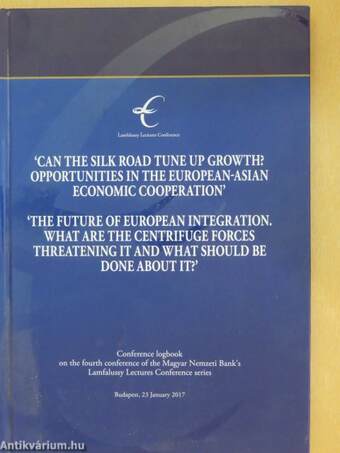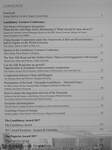1.035.157
kiadvánnyal nyújtjuk Magyarország legnagyobb antikvár könyv-kínálatát

VISSZA
A TETEJÉRE
JAVASLATOKÉszre-
vételek
Lamfalussy Lectures Conference 2017
'Can the silk road tune up growth? Opportunities in the european-asian economic cooperation'/'The future of european integration. What the centrifuge forces threatening it and what should be done about it?'
| Kiadó: | Magyar Nemzeti Bank |
|---|---|
| Kiadás helye: | Budapest |
| Kiadás éve: | |
| Kötés típusa: | Fűzött kemény papírkötés |
| Oldalszám: | 109 oldal |
| Sorozatcím: | Lamfalussy Lectures Conference |
| Kötetszám: | |
| Nyelv: | Angol |
| Méret: | 26 cm x 17 cm |
| ISBN: | |
| Megjegyzés: | Színes ábrákkal, kivehető melléklettel. |
naponta értesítjük a beérkező friss
kiadványokról
naponta értesítjük a beérkező friss
kiadványokról
Fülszöveg
The "Lamfalussy Lectures Conference" series, hosted by the Magyar Nemzeti Bank, is one of the key fora for European and global thinking on economic policy. The global financial and economic crisis has shaken the foundations of economics and shed new light on issues that were assumed to have been resolved. The initiative launched by the Magyar Nemzeti Bank in 2014 responded to a call for paradigm change by offering a platform for top-level Hungárián and international economic policy makers to exchange views on the changing economic world order. The high level of economic and financial integration calls for such an exchange of views in order to expedite the harmonisation of actions and to reinforce relationship networks among European decision-makers and leaders.
The 2017 conference, already the fourth in this series, was dedicated to new challenges facing Europe after the momentous changes brought about in 2016. While people in the UK voted for Brexit, other countries in the... Tovább
Fülszöveg
The "Lamfalussy Lectures Conference" series, hosted by the Magyar Nemzeti Bank, is one of the key fora for European and global thinking on economic policy. The global financial and economic crisis has shaken the foundations of economics and shed new light on issues that were assumed to have been resolved. The initiative launched by the Magyar Nemzeti Bank in 2014 responded to a call for paradigm change by offering a platform for top-level Hungárián and international economic policy makers to exchange views on the changing economic world order. The high level of economic and financial integration calls for such an exchange of views in order to expedite the harmonisation of actions and to reinforce relationship networks among European decision-makers and leaders.
The 2017 conference, already the fourth in this series, was dedicated to new challenges facing Europe after the momentous changes brought about in 2016. While people in the UK voted for Brexit, other countries in the European Union, including Greece, continued to struggle mending long-standing problems. Facing Europe's challenges is complicated by migration pressures and weakened ambitions for deeper integration among the electorate. Our conference this year approached these pressing problems írom a global perspective öffered by the One Beit One Road initiative. The initiative has two pillars: the so-called Silk Road Economic Beit ("the beit") and the 2151 century modern Maritime Silk Road ("the road"). It represents a modern trade network connecting more than 60 nations in Europe, Asia and Africa, and covering 40 percent of global GDP, and host about two-thirds of the world's population. How can the One Beit One Road initiative save Europe? The conference speakers demonstrated that providing a solid basis for a new economic and trade partnership between Asia, Europe and Africa such a joint effort can realize a new vision by mobilizing energies as well as bringing together resources. Thus, a new opportunity is presented for the European countries to increase their growth rate and create jobs. These are all key elements in breaking the magic triangle of stability, growth and reforms which are in the heart of the European integration, but which are apparently missing in many countries of the European Union.
The conference logbook sums up the presentations and papers by Jacques de Larosiére, former Managing Director of the IMF and former Governor of Banque de Francé; Tian Guoli, the Chairman of the Bank of China; Dr. Zhimin Chen, Dean of Fudan University; Erik F. Nielsen, Group Chief Economist of UniCredit Bank AG; Dr. Xuetong Yan, Dean of Tsinghua University; Ivo Maes, Senior Advisor of the National Bank of Belgium and editor of the book Alexandre Lamfalussy - SelectedEssays; professor Paul de Grauwe írom the London School of Economics and Political Science; Thomas Mayer, Founding Director of Flossbach von Storch Research Institute; György Szapáry, Chief Adviser to the Governor of the Magyar Nemzeti Bank and Dániel Palotai, Executive Director and Chief Economist of the Magyar Nemzeti Bank. The conference was hosted by György Matolcsy, Governor of the Magyar Nemzeti Bank. Viktor Orbán, Prime Minister of Hungary addressed the meeting by highlighting challenges brought about by current global and European trends. Vissza
Témakörök
- Közgazdaságtan > Gazdaságpolitika
- Közgazdaságtan > Pénzügy > Egyéb
- Idegennyelv > Idegennyelvű könyvek > Angol > Közgazdaságtan > Gazdaságpolitika
- Közgazdaságtan > Közgazdasági elméletek > Európai Unió
- Idegennyelv > Idegennyelvű könyvek > Angol > Közgazdaságtan > Közgazdasági elméletek > Európai Unió
- Idegennyelv > Idegennyelvű könyvek > Angol > Közgazdaságtan > Pénzügy > Egyéb

















